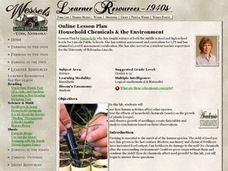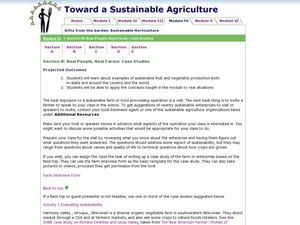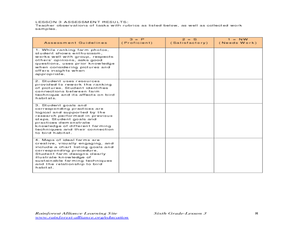Curated OER
Sustainable Agriculture
Learners perform an experiment to find out if plants grow best when grown in soil with no fertilizer, with chemical fertilizers, or with compost that they have made themselves. Students discover how agriculture practices can benefit the...
Curated OER
Household Chemicals & the Environment
Students conduct a laboratory experiment designed to investigate the effects of chemicals, soil quality and pollution on seed growth and plant yield. They consider how best to maximize agriculture in the long term.
NY Learns
Geography of the Fertile Crescent by ECSDM
Using Google Earth, a vocabulary assignment, and map handout, your class members will outline the Fertile Crescent in Mesopotamia and identify the source of the Tigris and Euphrates rivers. They will then complete graphic organizers...
United Nations
Compost Monitor Training
What should go in the trash, and what can be composted? Guide your young conservationists through the process of composing their trash with a lesson about the different ways we can dispose of garbage. Using a trash bag with clean...
Agriculture in the Classroom
A Rafter of Turkeys
How did that turkey get from the early Aztec culture to your table? Learn about the history of wild and domesticated turkeys in North America, as well as their inclusion in Thanksgiving traditions, with a two-part agricultural science...
Curated OER
Sorting
Young scholars experience sorting. In this organization lesson, students play a computer sorting game called "Flood Game" on the "Between the Lions" website. Young scholars visit a library and observe and discuss book organization....
Curated OER
Ag in My Community; Agriculture
Students build knowledge about agriculture as it relates to their communities' commodities. In this agriculture lesson, students brainstorm about conditions in their community with regards to growing different types...
Curated OER
Fresh Foods from Farm to Table
Are you a good egg? Learners begin a farm-to-table lesson by acting out verbs in groups to demonstrate the egg production process, and then research the steps using online resources. Several excellent videos are linked through the...
Curated OER
How Hot is Too Hot?
Fifth graders use the scientific method to conduct experiments on the temperature effects on organisms. In this temperature effects on organisms lesson plan, 5th graders observe and record the hatching or the developing of organisms into...
Curated OER
Property Rights: Soviet Farms
Students examine the problems with the collectivized agriculture program in the Soviet Union. They listen to a teacher-led lecture, participate in a property rights scenario activity, create a plan for maximizing the value of land, and...
Curated OER
Where Do Your Veggies Grow?
First graders investigate the origins of vegetables. In this Science lesson, 1st graders identify where fruits and vegetables come from. Students describe how people utilize plants.
Curated OER
Horticulture Crops in the agro-ecosystem
Ninth graders apply ecological analysis to fruit and vegetable production systems. In this horticulture activity students learn about different management practices.
Curated OER
Little Bees, Big Potential
After reading an article on the alfalfa leafcutting bee, learners chart its characteristics alongside those of the honeybee. Then they draw the leafcutter lifecycle. The article provides fascinating reading when studying the role of...
Curated OER
First You Take an Ecumene
Although this was written regarding Canadian agriculture, it can be used in any agriculture or environmental science class. Learners evaluate agricultural and economic activity maps and consider land use competition. Activities that get...
Curated OER
Real People, Real Farms: Case Studies
Students examine sustainable fruit and vegetable production. In this agriculture lesson students apply what they learn to real life situations.
Curated OER
Farming as a Way of Life
Sixth graders research the development of various agriculture techniques. Using this information, they determine how this led to the domestication of plants and animals and how other occupations were considered. They discuss the...
Curated OER
Fantastic Flower
Here is a clever lesson on pollination of flowers for you. In it, learners study the anatomy of a flower, and play a game in which they simulate the process of pollination. This fine plan brings in elements of art, physical education,...
Curated OER
How can my breakfast help the birds?
Sixth graders design farms with a bird's habitat in mind. In this farm lesson plan, 6th graders research how sun grown coffee destroys a bird habitat, and then they make their own farm with a bird's habitat being preserved. They then...
Curated OER
Sustainability
Here is an in-depth, and incredibly thorough lesson plan on sustainable agricultural practices; specifically, regarding the growth of coffee. After completing and discussing a worksheet called "Thinking About Tomorrow," groups of...
Curated OER
Closing the Salary Gap
Students explore careers in their community and compare the average salaries for men and women working in those careers. They explore a variety of careers available in their community through participating in this lesson.
Curated OER
Contrasting Landscapes - UBC Farm Field Trip
Students visit the UBC Farm. For this lesson on various landscapes, students spend a day at the University of British Columbia exploring the farm and trail adjoining the campus. This lesson could be modified for use in any region that...
Chicago Botanic Garden
Impacts of Climate Change
Scholars become experts on the eight major impacts of climate change through a jigsaw and grand conversation. They then research and present what they learned about effects specific to their region.
Curated OER
The Designed World
Students visit a school or public library and study how information is organized. In this information management lesson, students answer a group of questions about the organizational method of the library. Students then practice sorting...
Curated OER
DNA: The Human Body Recipe
Pupils describe DNA and the roles in which engineers are involved with the human body. In this DNA lesson students participate in a class demonstration.























